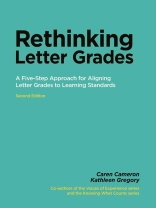Authors, Caren Cameron and Kathleen Gregory, offer a practical five-step process for arriving at letter grades that moves away from collecting a string of marks and calculating a grade. They offer an alternative assessment method by examining a wide variety of assessment tools (rating scales, scoring keys, rubrics, test scores, observation records, discussion notes, symbols, portfolio collections, and more) and match the student evidence with a description of achievement.
Tabella dei contenuti
Contents
Introduction
- Who Is This Book For?
- What Is This Book About?
- Why Use a Different Approach? Why Now?
- How Is This Book Organized?
- What Are Our Intentions for Writing This Book?
1. Arriving at Letter Grades: Focus on Numbers
- Some Key Research Findings
- Changing our Focus
2. Arriving at Letter Grades: Focus on Learning
- The Five-Step Process
3. Arriving at Letter Grades: Focus on Working It Through
- Step 1: Identify Three to Five Big Ideas for One Subject Area
- Step 2: Write Three Levels of Performance for Each Big Idea
- Step 3: Identify Evidence that Shows Student Performance
- Step 4: Highlight Descriptions of Learning on the Learning Map
- Step 5: Determine a Letter Grade (and a Percentage if Necessary)
4. Arriving at Letter Grades: Focus on Questions
- Frequently Asked Questions
5. Rethinking Letter Grades: Focus on Personal Findings
- Three Reminders
- Seven Findings
Appendix 1: Example of Conversion from a Letter Grade to a Percentage
Appendix 2: Big Ideas for Different Subject Areas
Appendix 3: Descriptive Language for Learning Maps
Appendix 4: Parent Brochure
Appendix 5: Conversation Cards
Appendix 6: Article: “Arriving at Letter Grades: Get Closer to the Learning”
Circa l’autore
Kathleen Gregory, M.Ed. has retired from a wide-ranging career in education. She taught in elementary, middle and secondary schools and became a district curriculum coordinator and a district support teacher for classroom teachers and school teams who were integrating students with special needs. Kathleen was an instructor for assessment courses at the University of Victoria and Vancouver Island University, and worked with colleagues across BC on strategies in literacy and assessment.












